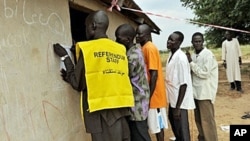The stalemate over Sudan's oil-rich Abyei region is at the center of current high-level discussions and negotiations over the east-African nation's uncertain future.
With less than two months before the scheduled January 9 referenda on self-determination for south Sudan and for the people of Abyei to decide whether they will go with the north or south, Africa advocacy director at Human Rights Watch, Jon Elliott, is one of many experts with great concern.
"There has been very little progress on agreeing the arrangements for the vote in Abyei particularly and that has got to be worrying in the run-up to January. It is a key flashpoint and we want to see much more focus from world leaders on making sure that the risks of that flashpoint becoming conflict are minimized," Elliott states.
The referenda are a key component of the slow to implement Comprehensive Peace Agreement of 2005 between Sudan's government and southern rebels to end two decades of fighting.
Smith College Professor Eric Reeves says the government in Khartoum is bargaining in many directions to get the most it can from international negotiators and the Juba-based southern leaders before the country's possible breakup.
"They are going to try, as they have relentlessly for decades particularly the last two, to push that north-south border southward, bring more oil into the north, extract oil in the north from reservoirs that run into the south," Reeves said. "They are going to try to foist national debt now standing at $36 or $37 billion, as much external debt as possible on Juba, knowing that Juba will be able to enjoy debt relief, but the real ace, the trick they really want to take is Abyei."
Reeves says there is much more to Abyei than oil wealth. "There are a lot of people along that border. There is a lot of arable land, particularly more to the east. There has been a lot of agri-pastoralist movement one side of the border into the other and some of the political constituencies, especially the Misseriya in the Abyei area are very powerful," he says, "They are already angry at Khartoum and they will be angrier if they are not properly informed what the implications of the Abyei self-determination referendum are. What I see is Khartoum trying to stack that vote by settling Misseriya."
One of the most contentious issues is whether the nomadic, pro-Khartoum Misseriya, who regularly pass through Abyei, will be allowed to vote.
John Prendergast, from the U.S-based Enough project, says the resident Dinka made it clear to him on a recent visit they will go to war if they do not get the right to join the south. At the end of the day, a grand bargain is going to have to be struck, a package deal is going to have to be struck and negotiated that involves the interests of all these different groups and Abyei's status in some way, shape or form is going to be part of that negotiation," he said.
United States Institute for Peace Senior Program Officer for Sudan Jonathan Temin is urging leaders from both Khartoum and Juba to compromise. "I think for an outcome to be found, both parties are going to have to make some compromises," he said. "It is hard to see how one party would compromise without compromises coming from the other side, so I doubt either of them will get an agreement that fully satisfies them if there is an agreement to be had, but that is the nature of negotiations."
Temin and the other Sudan experts say the next few weeks will be crucial in determining whether Sudan can avoid a return to a north versus south conflict. High-level negotiations stopped for a few days this week as top Sudanese leaders, including President Omar al-Bashir, performed the Muslim pilgrimage hajj in Saudi Arabia.
The president's trip took place despite an outstanding arrest warrant against him by the International Criminal Court in the Hague for alleged crimes against humanity and genocide in Sudan's western Darfur region, where the conflict is ongoing. Mr. Bashir says he is the victim of a Western plot against him and Sudan's unity.
Abyei Stalemate Dominates Sudan Negotiations












